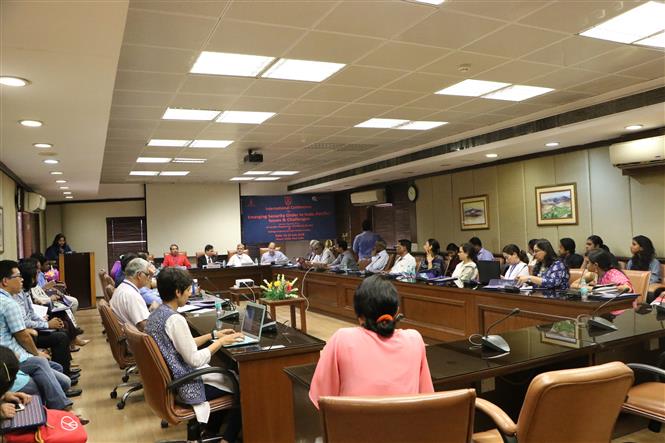
An international workshop on emerging security order in the Indo – Pacific: issues and challenges took place in New Delhi, India from July 14-15.
At the event (Source:
VNA)
Speaking at the event, Vietnamese
Ambassador to India Ton Sinh Thanh said the Indo-Pacific region is attracting
attention in the context of rapid changes in regional and world situation and
in power balance along with increasing grave challenges to peace, stability and
development.
He noted that the current situation in the East Sea
is one of the threats to peace, stability and freedom of navigation, aviation
and trade in this region.
The world is witnessing activities to reclaim and construct artificial islands
in the East Sea and militarisation via the installment
of equipment and weapons, which the Ambassador said is threatening not only the
sovereignty of Southeast Asian nations but also the freedom of maritime,
aviation and trade of countries outside the region.
The diplomat emphasised the importance of the Indo-Pacific and the East Sea in
particular to Vietnam,
noting that the country holds sovereignty of not only the Hoang Sa (Paracel)
and Truong Sa (Spratly) archipelagos but also 3,000 other islands and islets.
With a coastline of 3,260km stretching from the north to the south, Vietnam has
more than 1 million sq.km of exclusive economic zone under the United Nations
Convention on the Law of the Sea.
He said the East Sea is vital to the Vietnamese economy as it is the country’s
main gateway to the world, adding that if the East Sea is occupied, not only
Vietnam’s security will be threatened but its economy will also be seriously
hurt.
In addition, the Indo – Pacific is also of vital importance to Vietnam as most
of its biggest strategic and economic partners are located in the region.
The ambassador recalled President Tran Dai Quang’s speech to Indian statesmen,
professors, researchers, scholars and students at Nehru Memorial Museum in
India in March this year, in which the President called on countries to share a
common vision about an open region based on international law and sharing
common interest in maintaining peace, stability and inclusive prosperity, in
which no country, no ethnic group and no population are left behind.
All countries should strive to defend freedom and unobstructed traffic of
maritime, aviation and trade routes so that the Indian
Ocean – Pacific will not be divided into sub-regions that are
manipulated by powerful countries, impeded by protectionism and divided by
insular nationalism, he said.
Ambassador Thanh also urged countries to establish effective mechanisms to
maintain peace, stability and the rule of law, ensure common security, prevent
conflicts and war, and effectively cope with traditional and non-traditional
security challenges.
He stressed that Vietnam’s
viewpoint on the Indo-Asia-Pacific region has many similarities with Indian PM
Narendra Modi’s vision about the Indo – Pacific as outlined in his keynote
speech at the Shangri La Dialogue held in Singapore
in June 1, stressing that both Vietnam
and India
want to engage in instead of confronting in the settlement of regional issues.
Participants at the event shared the view that the Indian
Ocean – Pacific is emerging as the most important region with its
status as a geopolitical and geo-economical hub, a busy trade corridor of the
most importance globally with nearly two-thirds of petrol and one third of
global cargo going through it.
However, the lack of cooperation rules and trust building measures, along with
unsettled disputes and competition for scarce natural resources are seriously
threatening regional peace and stability.
The event at the Indian Council of Social Science Research was co-hosted by
theCentre for Canadian,US&Latin
AmericanStudies under Jawaharlal
Nehru University,and
the Kalinga Research Institute for Indo-Pacific Studies.
Source: VNA
Throughout his revolutionary life, Uncle Ho visited Hoa Binh province four times. He also sent dozens of letters, telegrams, greeting cards, and heartfelt messages to local officials, Party members, and people of all ethnic groups, urging them to remain united, support one another, strive for progress, and actively engage in both production and resistance efforts to build a prosperous homeland.
To unlock the full potential of its forest resources, the standing board of the provincial Party Committee on July 30, 2020 issued a Resolution on the sustainable development of production forests through 2025, with a vision toward 2030.
In recent years, the education and training sector in Cao Phong district, Hoa Binh province, has actively integrated its tasks with the promotion of studying and following President Ho Chi Minh’s thought, ethics, and style. This approach has contributed significantly to improving the overall quality of education across the district.
The Hoa Binh provincial museum on May 16 opened a thematic exhibition "Under the flag of the glorious Communist Party of Vietnam" with more than 200 documents, images and objects featuring the glorious 95-year journey of the Party.
Hoa Binh police are collecting public feedback on amendments to the 2013 Constitution via the national identification app VNeID. This innovative approach marks a giant leap towards modernising grassroots democracy and enhancing transparency in public consultation.
Nguyen Phi Long, alternate Member of the Party Central Committee and Secretary of the Hoa Binh Party Committee, on May 14 chaired a meeting of the provincial steering committee for its programme to eliminate makeshift and dilapidated housing for the poor. The session reviewed the programme’s outcomes to date and discussed forthcoming tasks.



